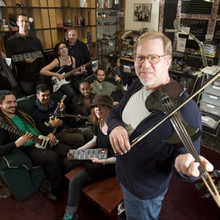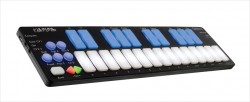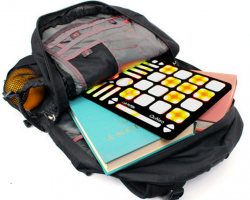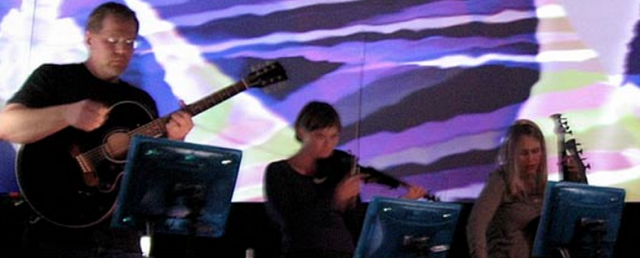 Keith McMillen has been exploring new ideas for electronic music instruments for nearly 35 years, starting in 1979 with his company Zeta Music and more recently with Keith McMillen Instruments. His most recent creations are the QuNeo and the just-released QuNexus controllers.
Keith McMillen has been exploring new ideas for electronic music instruments for nearly 35 years, starting in 1979 with his company Zeta Music and more recently with Keith McMillen Instruments. His most recent creations are the QuNeo and the just-released QuNexus controllers.
Synthtopia’s Elisabeth Lewin talked with McMillen about development of the QuNeo and QuNexus controllers in part 1 of our Keith McMillen interview. In part 2, McMillen answers some reader’s questions on his instruments, discusses the state of MIDI, talks about performing with his own group and more.
 Synthtopia: One of our readers asked, “What synths or software synths do you recommend using with your QuNexus controller?”
Synthtopia: One of our readers asked, “What synths or software synths do you recommend using with your QuNexus controller?”
Keith McMillen: What synths? You know, we kind of passed on that by supporting all synths. We put in CV support and you can plug a MIDI expander into it, too.
Musicians are pack rats, a lot of them don’t ever throw or give any instrument away. And there’s a big resurgence in CV synthesis. And I think that people work differently if they have knobs and sliders and a bunch of patch cords in front of them.
For me, I don’t really have a preference for which synth people use with QuNexus. I think that there’s value in pretty much every version of synth that’s come out.
Synthtopia: That’s a really diplomatic answer.
Keith McMillen: (Laughs) That’s treacherous. I didn’t want to step in that one.
Synthtopia: You dodged that handily! Okay. Another Synthtopia reader asked when or whether there’ll be a Max developer kit for the QuNeo.
Keith McMillen: We are producing a developer kit for the QuNeo. It’s progressing and I expect something to be available within months.
It will expose the raw sensor data, will allow you to have increased resolution and will be for hackers and programmers etc. And, with our latest update for QuNeo, v. 1.22 — all of the scripts, python scripts, etc, are included in a non-compiled form, so that people can experiment with them.
We like that, but it takes time to support those additional releases with documentation, we do have to test them and make sure that they work. So the QuNeo scripts will be out probably in — perhaps a matter of days? — and the development kit, probably in a matter of months.
But as you probably know, most musicians never go there [to use a developer kit]. So financially, we have to focus our efforts to support the needs of the many. And we spend a lot of time integrating our products with software, and we are getting more and more software developers to include the QuNeo and QuNexus as supported input devices. And there’s a real need for that.
You know, a lot of controllers only work with one type of software, and I understand that’s a nice controllable universe, and it’s repeatable, and you know what you need to learn. But, with the flexibility we have, it’s a challenge.
[With] Most controllers of any type up to now, you do one thing, and you get one result, one MIDI message. You hit a key, you get a note. You move the bend wheel, you get a bend message. But, when you hit a pad on the QuNeo, four messages go out. You continue to press the pad, or relocate or move your finger around, you continue to output messages. And a lot of the software out there doesn’t know how to deal with that.So, to go back to touch on your question about synths for a minute, I think the ones that allow for more control info are better. And we’ve had to solve that problem, so that we can train software. People seem to understand that, … but it’s unfortunate that that is a necessity. Hopefully, it will inspire others to make more responsive synths!
 Synthtopia: What are your throughts on MIDI and the current state of music controllers?
Synthtopia: What are your throughts on MIDI and the current state of music controllers?
Keith McMillen: MIDI is 30 years old this year, and continues to serve us well. And I don’t think that MIDI will go away – nor should it.
If you look at parallels in other computer-based representations of human information, in the early 60s there was a standard, ASCII, and it basically set up communicating written information. It’s a lot like MIDI is [used] for communicating music information.
ASCII would send the letter B, or it would send a question mark. You would see a letter B, or see a question mark, on your computer screen and your computer software understood the letter B or the question mark.
It worked well, and still works well, but about 30 years after ASCII developed as a computer standard, we started getting into PostScript and started getting into laser printers. And you could not only send a letter B, but you could also pick a font for the letter B, and you could have the letter B display in italics, and put a drop shadow behind it, or make your letter B in color.
That’s where we are with MIDI.
We can transmit a note number and that is always going to be important, but I think we also need to be able to transmit the ‘color’ of the note and the character of the note, and the evolution of a note over time – and that’s going to take new standards.
 Synthtopia: Thinking about that evolution from ASCII to PostScript, changing technology removed barriers to access. Typesetting and layout were no longer the exclusive province of the typographer, the color separator and the designer. Anyone could get a copy of PageMaker and a laser printer and create their own publications.
Synthtopia: Thinking about that evolution from ASCII to PostScript, changing technology removed barriers to access. Typesetting and layout were no longer the exclusive province of the typographer, the color separator and the designer. Anyone could get a copy of PageMaker and a laser printer and create their own publications.
Some people argued at that time that the widespread adoption of desktop publishing lowered the overall quality of communications media, because, all of a sudden, anyone could be a publisher. And some make the same argument about today’s music technology – that it’s dumbing down music.
What are your thoughts on this democratization of technology and its impact on music?
Keith McMillen: The democratization of technology is inevitable, no matter what I think. My opinion (good or bad) is not going to change the availability of 99 cent synthesizer apps. And the availability of 99 cent synthesizer apps is not going to hurt music, overall, anyway. It really does not hurt.
In 1929, something like 30+ percent of American homes had a piano in it. But the presence of a piano in amateur musicians’ homes did not reduce the virtuosity of great instrumentalists, then or now.
It is entertainment for some people to create their own music; it’s musical and artistic expression for others.
I think the availability of affordable instruments has always been part of what technology brings, whether it’s a hurdy-gurdy or a synthesizer. If people want it, someone will figure out how to make it available.
Want to know what I think is a really troubling trend? Education has suffered.
Because of that, fewer people are learning music, learning the basics and understanding what goes into music. And that affects the variety and the quality of the music we have present in our society.
But I don’t think that there’s any danger of artistic virtuosity going away, just because more people have these things.
 Synthtopia: You founded a non-profit organization, BEAM, with a mission to “spark a new Western classical music movement, based on the technologies and aesthetics of the 21st century.” And a variety of music technologists, from Max Matthews to Tom Oberheim to Jaron Lanier have expressed their support.
Synthtopia: You founded a non-profit organization, BEAM, with a mission to “spark a new Western classical music movement, based on the technologies and aesthetics of the 21st century.” And a variety of music technologists, from Max Matthews to Tom Oberheim to Jaron Lanier have expressed their support.
Tell us about BEAM and what you hope that it can accomplish.
Keith McMillen: BEAM encompasses my personal obsession.
I sold a company in 2005, Octave, and was able to put a lot of money into BEAM. We did a lot of work in a few years and made a lot of progress in a towards the goal stated.
But the BEAM target overall is not different than the KMI target. We need new instruments, we need greater responsiveness, we need to understand what is important in controllers and how to organize information, how to communicate that information, and all of that is necessary for the goals of BEAM to be realized.
So, these two complement each other. I’m working mostly on advancing KMI, but still continue to push the agenda of BEAM forward, through talks and work that is taking place outside of KMI.
Synthtopia: You perform with a group called TrioMetrik, which seems to be not just a modern music ensemble, but also a sort of platform for composers, based on networked musicians and new instruments.
Can you tell us about TrioMetrik and how it relates to your work with KMI?
Keith McMillen: Surely. Well, one member of TrioMetrik, Ashley Adams, has been working with me since the late 90s, and is really fantastic at integrating technology into performance. She’s been a touchstone in knowing if I’m on the right track or not.
 This goal of having networked musicians with traditional stringed instruments is challenging, and it takes not only the instruments but the compositional environment, the performance environment, and how data is stored so that pieces don’t fall apart over time – because technology changes.
This goal of having networked musicians with traditional stringed instruments is challenging, and it takes not only the instruments but the compositional environment, the performance environment, and how data is stored so that pieces don’t fall apart over time – because technology changes.
TrioMetrik has allowed me to experiment and to get composers to write for us – to test the veracity of the concepts, the system, the software and the ease of use / playability.
It’s really kind of like car companies build racing cars – they take ’em out on the track to see how they do. I think Triometrik is the “racing car” that I use to see how well the hardware and software perform.
It’s a lot of fun – and I hope to return to it. And it also inspired work to generalize the information, so that it could affect video, which was new for me, being an audio guy, and I just think there’s so many things that can happen artistically, once the gestures and sound of the musicians are properly digested by a computer and generalized in a way that they can be used to influence the score, to influence each other, to influence the imagery.
It’s a starting point. And I think that’s really where the 21st century music will go – as we integrate networked computers, which is arguably the greatest result of the century’s efforts in technology.
So bringing it to bear on music is my job, and Triometrik is the test vehicle for seeing if it’s working or not.
Synthtopia: What can you tell us about your plans for the future?
 Keith McMillen: Having spent a couple years with Triometrik touring and playing music, it really made it clear to me how inconvenient a lot of gear is, in terms of its weight and size and reliability. So, the practical side of me wants to continue work in that area.
Keith McMillen: Having spent a couple years with Triometrik touring and playing music, it really made it clear to me how inconvenient a lot of gear is, in terms of its weight and size and reliability. So, the practical side of me wants to continue work in that area.
I have some ideas in that area that i hope to “productize” that will make musicians’ life a lot more comfortable and practical in terms of playing “out” and also, in the bargain, not giving the airlines all your money.
Synthtopia: Anything else you think our readers ought to know?
Keith McMillen: Connecting with people who appreciate what we do is deeply satisfying. I hope this provides a little window into the soul of what we’re doing here.
Thanks again – Synthtopia does a great job, and I am delighted to have this opportunity to talk in depth about what we do, and share that with your readers.
Synthtopia: Thank you, Keith. I appreciate you taking the time to answer my questions.
Keith McMillen: You’re welcome. It’s been a pleasure.
About Keith McMillen
Keith received his BS in Acoustics from the University of Illinois, where he also trained in classical guitar and studied composition. He founded Zeta Music in 1979 and created new guitar effects, the first programmable MIDI audio mixer, and modern violins for the likes of Jean-Luc Ponty and Laurie Anderson. McMillen knew he had made it when a Zeta violin appeared on Playboy’s Sex and Music issue. He notes, “People bought the magazine for the violin article.”
McMillen has also worked as VP or R&D at Gibson Guitars, Director of Engineering at Harmon Kardon and as founder and CEO of Octiv, a provider of audio signal processing technology. McMillen sold Octiv to Plantronics in 2005.
Since then, he has founded BEAM, a non-profit dedicated to promoting new music, and Keith McMillen Instruments, a new music technology company. Recently, McMilen has helped pioneer the use of Kickstarter as a tool for funding new instrument development, successfully funding and developing the QuNeo 3D MultiTouch Pad Controller.
A timeline of McMillen’s work is available at his site (pdf).


This is all well and good but, WHEN WILL THE QUNEXUES BE AVAILABLE ???????? EVER????????.
It seems like no one really knows. I’m told from the people at KMI a month ago, now sweetwater says next month. I’m almost completely over this. I understand pushing back a relase date for whatever reason but keeping everything up in the air is just bad business.
It’s already shipiping.
Did you pre-order it, though? It seems like there’s more demand than devices at this point.
I preorder mine in December .
They just announced a couple of days ago that they were now shipping. I’d hope that they’d fill the Kickstarter orders first and places like Sweetwater second.
A keyboard with nice features but no instrument to play with.
McMillen’s clearly pretty brilliant and his company is doing some great stuff.
I’d like to see ‘Pro’ version of the QuNexus, though, that would be a little heavier for greater stability and with an expanded key range. Make it taller and give it full size MIDI connectors and 1/4″ jacks. I think there would be a lot of interest in something like that.
You mean like this? http://www.weareroli.com/#products
Yes, it’s _very_ expensive. Perhaps you’d be happy with the affordable QuNexus after looking at the price points.
I was hoping for a middle ground! Maybe I’m too cheap for nice instruments! 🙂
His announcement made the SOFTSTEP get sold out everywhere… I think thats the controller most people actually need vs another thing to input stuff with your hands. I contemplated the SoftStep for awhile… and it really came down to my limited 2 arms to do things… and having to switch to another page on a controller to do something is annoying… For example.. lets say I have Maschine running.. and I want to turn something off in Ableton using the MIDI mode on Maschine.. Sure its easy to toggle on and off… but what if I need to do that in the middle of a finger drumming. Even If I had a launchpad nearby dedicated to ableton.. I still would have to move my hand off the drum pads… Doing it with my feet is something that unlocks a more fluid way of improv. Now I just need to learn how to coordinate my feet
“Now I just need to learn how to coordinate my feet”
So true! I saw Tony Monaco perform a few years ago and he blew me away doing walking basslines with the organ pedals. Massive technique!
The broad way Keith talks reminds me of Bob Moog. It wasn’t all tech-talk with him, either; he often commented on the creative abstractions and how fascinated he was by the things artists did with his gear. I could never totally give up “just” the keyboard, because all of my piano time is so much of the foundation in my synth playing, but I can really see the Q’s breakthrough design. It operates on the X-Y axis and then some, without being at all arcane about it. I say again, if this first Q flies well, I’d leap on a 4-octave version, especially if it had slightly larger keys. I want my established skills to count, but having poly-pressure means I could play a string quartet that sports entirely superior balls. Go, Keith, go!
KMI is doing some clever things with the controllers, I’ll support that claim. I asked previously about the future of Stringport which was unsurprisingly not answered in the previous comments or mentioned here at all. I’ll echo my disappointment with the lack of update/support with this hardware/software. If its being abandoned then let me know so I can use it as a paperweight or recycle it for parts or something…. Simple question, a response would be great.
Anton
Anton – we interviewed Keith before you posted your question, which is why it could not be addressed in out interview.
Hi Anton – StringPort software was last updated 4 months ago so I am not sure what you mean by lack of support. We are sold out now and because we have to purchase inventory for a lot of products (which is especially tough for a small company). So it is very difficult to keep everything on the shelf. I am a guitarist and work with other string players and computer interfaces for strings is probably my favorite topic so there is no lack of commitment.
– Keith
Hi Keith, the last update I could find was Feb 28 of 2012 (StringPort Guitar (1702)). And it was very unstable and unreliable to work with.
http://forum.keithmcmillen.com/viewforum.php?f=6
This is the only place I know of to find updates for string port, if there has been some new developments, please if you could direct me to a better place to stay up to date that would be great.
Thanks,
Anton
On our downloads page for StringPort:
http://www.keithmcmillen.com/stringport/downloads/
Last update was 1/18/13
– Keith
Keith – Thanks for addressing the reader questions!
NewsFlash! people who click the thumbs down for no real reason have balls the size of field mice
I Iove KM and how after all these years he still has a an almost childlike enthusiasm for music, musical instruments, and musicians. To me he’s a genius, I just dont understand people who arent excited about the QuNexus. It bridges all the needs of the modern musician like me who is as excited about iPad stuff as he is about Monotribes and Moogerfoogers. A little CV will certainly thicken up a thin soft synth that’s for sure. Plus there’s polyphonic after touch- a must-have for every “synth-head” in the world (naturally that includes “synthead”)I I can’t recall ever seeing a brand new controller that has any where near this number of features at this price point plus it looks fun as shit 😉
i really agree with the point on music education.
one of my lecturers went to uni, had an interest in music and with no background at all was able to study music, perform with the choir, and has a really strong education in musc. nowadays universities want you to have your exams, and audition to get in, and i dontthink it’
s really helping young musicians who fell into music on their own, or whose music theory is only at second grade – if they have a passion and interest to pursue a music degree, if they want to leaern the theory and perform etc, let them do so. dont hold up this massive barrier that says “pay for years of piano classes that your parents couldnt afford before we’ll let you in.
i can understand why they do it, but they didnt always do it. and i think it needs to be reviewed, espectially as universities are looking more and more towards practical degrees and music degrees are becoming a rarity.
If I ever pick one of these beauties up I’m gonna have to give it a make over, aesthetically toy like for the price point.
I’ll defend the appearance of the Q because it looks nice to me personally and because its trying to hit that sweet spot between function and visual appeal. Its clearly aimed at lap-topping somewhat, but again, I can mentally FEEL what it will be like to perform a lush solo line with it. That’s a serious consideration in deciding to commit to a new tool. I’m also sure Keith will just grin if you post a shot of it with a jazzed-up case. 😉